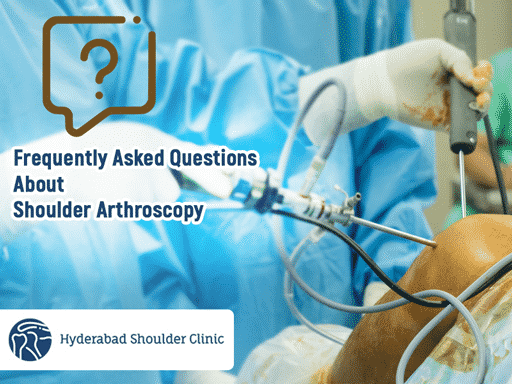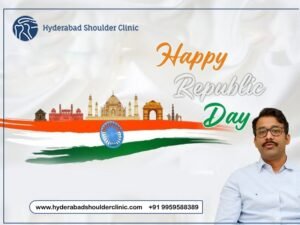Frozen shoulder is a painful condition that results from inflammation and scarring in the shoulder capsule, i.e. the thick layer of shoulder joints. It is not clear why this occurs. If left untreated, shoulders will become harder with the possibility of a loss of function.
Patients with frozen shoulder have difficulty with simple joint movements. The typical symptom of frozen shoulders is a pain when moving the arm, even during simple activities such as washing hair, wearing a belt or wearing a dress. If you are experiencing any of these symptoms, you may be suffering from frozen shoulder, also known as adhesive capsulitis.
Treatment of frozen shoulders is best with simple non-surgical treatments. Although treatment can be simple, recovery can take months or even years, and some may not fully recover. Patients who have tried this method to improve shoulder mobility but are still limited by pain and stiffness can consider frozen shoulder surgery.
This article will help you to understand more about frozen shoulders and when to undergo surgery for a frozen shoulder.
Frozen Shoulder:

One of the most common causes of frozen shoulder is immobility, which can occur during recovery after a shoulder injury, a broken arm, or a blow. If you have an injury that makes it difficult to move your shoulder, talk to your doctor about exercises you can do to freely move the shoulder.
If your doctor diagnoses adhesive capsulitis, then you might be in one of the three stages below. The duration of each stage varies from person to person.
- The freezing stage 1: The shoulder becomes more painful, and you slowly lose your freedom of movement. This usually occurs for 6 to 9 weeks. At stage 1, your shoulder hurts and begins to harden. The pain may slowly increase over the next few months. Loss of shoulder movement at this stage is due to inflammation, progressive contractions and thickening of the shoulder capsule ( that surround the shoulder).
- Frozen stage 2: This stage immediately follows the freezing stage and is usually not very painful, although the stiffness persists. This usually takes around 4 to 6 months, which makes daily activities very difficult. In this stage, your shoulders are stiff but no longer hurt at rest. The shoulder capsule is scarred, thicker and firmer than usual. Scars limit the range of motion and can cause pain while stretching or range of motion movements.
- Thawing phase 3: This phase is the point at which the shoulder slowly improves or returns to fully normal or near-normal strength and movement. This usually takes six months to 2 years. Your shoulder movements gradually return, and your shoulder functionality improves.
Treatments available for Frozen Shoulder:
Idiopathic adhesive capsulitis or frozen shoulder must be diagnosed early and correctly. Depending on the stage, the following are available treatment options:
- Physical therapy which includes progressive capsule stretching,
- Subacromial or Glenohumeral injection of steroids under fluoroscopic guidance
- anti-inflammatory drugs.
How can this condition be treated non surgically?

The goal of this treatment is to reduce the underlying inflammation and prevent hardening of your shoulders. Non-surgical treatment is the first choice.. Surgical treatment is the second choice, which may be appropriate in severe cases or when non-surgical treatment is unsuccessful.
Non-surgical treatment can consist of anti-inflammatory and pain relievers prescribed by a doctor. Your doctor can also recommend corticosteroid injections into the shoulder. These injections are beneficial in the early stages of adhesive capsulitis and reduce your pain and increase range of movement on your shoulders.
Physiotherapy is an essential part of treatment because progressive stretching is needed to restore lost range of motion. This treatment is based on an assessment by a physiotherapist and individually for you.
Indications for frozen shoulder surgery:

Surgery to treat idiopathic adhesive capsulitis is usually done when the patient’s pain tends to increase after injected with steroids, or when the patient has significant residual pain and stiffness after 4 to 6 months of conservative treatment.
The most common indication for surgery is residual pain or functional restriction after conservative treatment. Surgery is for patients who have worked hard in therapy for months but still have severe pain and still have stiff shoulders.
However, people in stage 1 and 2 can be operated on. In the subacute stage, scarring and thickening of the capsule appear together with more constant and intense pain and increased stiffness. The third stage, either chronic or thawing stage, is related to a reduction in pain and stiffness that persists but gradually decreases with time. In some cases, with refractory rigidity in the chronic phase, arthroscopic release and manipulation can help.
Remember that patients who will undergo surgery for this condition may not be in the acute stage of frozen shoulder. The third stage is characterized by severe pain and limited capsule stiffness. Often the shoulders are so inflamed and painful that it is difficult to judge the actual level of stiffness.
Surgery:

There are two surgical treatments for adhesive capsulitis.
Manipulation under anaesthesia: After the anaesthesia is given, your surgeon will move your shoulder over the entire range of motion to destroy scarring and increase the mobility of your shoulder. There are several risks associated with this procedure that you should discuss with your doctor.
Arthroscopy and capsular release: This is usually done for patients who are in the second or third stage. After giving anaesthesia, your surgeon will put a camera and other instruments in your shoulder through a tiny incision so that the inside of your shoulder is visible. The remaining inflammation is treated, and scar tissue is removed surgically.
In the case of a frozen shoulder, the problem is a tight shoulder capsule, and therefore the treatment for that is to cut the tight capsule so that the joints have more freedom of movement. The instrument is placed to cut the capsule around the shoulder.
The most important aspect of the arthroscopic release is to ensure that improvements in shoulder mobility are maintained after surgery. Sometimes patients have a unique splinted arm to hold the capsule tightly to the shoulder. More often, physical therapy begins immediately after surgery to ensure that scar tissue no longer forms around the joint.
Physiotherapy is also essential for your recovery after surgery. Your physiotherapist will prescribe exercises to maintain the movements you receive during the operation.
Conclusion:
Surgery is rarely used to treat frozen shoulders, but there are cases where non-surgical treatment is not effective in controlling this condition. If long-term non-surgical treatment does not relieve symptoms, surgery can be considered an option. The most crucial aspect of all types of frozen shoulder surgery is to ensure that you can move the shoulder as soon as possible after the operation.
For more information on frozen shoulder treatment and surgery, contact Dr Chandra Sekhar. B at Hyderabad Shoulder Clinic. Book your appointment by contacting at +91 9959588389 or visit the website for more details.





